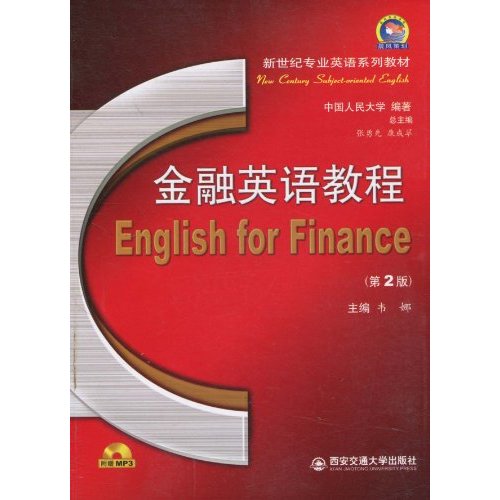
金融英语教程-(第2版)-(附赠MP3光盘一张)

- ISBN:9787560531625
- 装帧:暂无
- 册数:暂无
- 重量:暂无
- 开本:16开
- 页数:234页
- 出版时间:2010-09-01
- 条形码:9787560531625 ; 978-7-5605-3162-5
本书特色
《金融英语教程(第2版)》是新世纪专业英语系列教材。
目录
节选
《金融英语教程(第2版)》主要由国际贸易概论和国际贸易实用操作两部分组成,是通俗国际贸易理论与国际贸易工作实践的结合。该教材采用了大量来源于生活、工作中的国际贸易资料来阐明相应的国际贸易理论,理论中有实践,实践中又渗透出理论,充分展现了生活、工作中大量存在的国际贸易现象,从全新的角度分析了国际贸易的丰富内涵。该教材用灵活多样的形式、地道的语言以及来源于生活、工作中的案例对国际贸易知识的普及以及解决工作中的实际问题将起到启迪及积极的推动作用。《金融英语教程(第2版)》适合国际贸易专业及其他专业的学生、与国际贸易相关的工作人员及需要此方面知识的人士使用。
相关资料
插图:A firm or an individual can obtain funds in a financial market in two ways. The most common method is to issue a debt instrument, such as a bond or a mortgage, which is a contractual agreement by the borrower to pay the holder of the instrument fixed dollar amounts at regular intervals(interest and principal payments)until a specified date(the maturity date), when a final payment is made. The maturity of a debt instrument is the time(term) to that instrument's expiration date. A debt instrument is short-term if its maturity is less than a year and long-term if its maturity is ten years or longer. Debt instruments with maturity between one and ten years are said to be intermediate-term.The second method of raising funds is by issuing equities, such as common stock, which are claims to share in the net income (income after expenses and taxes) and theassets of a business. If you own one share of common stock in a company that has issued one million shares, you are entitled to 1 one-millionth of the firm's net income and 1 one-milli0nth of the firm's assets. Equities usually make periodic payments (dividends) to their holders and are considered long-term securities because they have no maturity date.The main disadvantage of owning a corporation's equities rather than its debt is that an equity holder isa residual claimant: that is, the corporation must pay all its debt holders before it pays its equity holders. The advantage of holding equities is that equity holders benefit directly from any increases in the corporation's profitability or asset value because equities confer ownership rights on the equity holders. Debt holders do not share in this benefit because their dollar payments are fixed.
-

地心游记(纯英文)/床头灯英语.3000词读物
¥9.0¥15.8 -

本杰明:富兰克林自传
¥5.9¥13.5 -

茶花女
¥5.3¥12.0 -

THE GREAT GATSBY-了不起的盖茨比
¥5.0¥16.8 -

小妇人(纯英文)/床头灯英语.3000词读物
¥4.7¥15.8 -

写给儿童看的英语:情境联想600句(英汉对照)
¥17.1¥39.8 -

了不起的盖茨比(纯英文)/床头灯英语.3000词读物
¥7.3¥12.8 -

最新英汉百科图解词典-升级版
¥104.2¥168.0 -

沉思录
¥10.5¥21.0 -

方法论
¥3.3¥9.5 -

飞鸟集(泰戈尔英汉双语诗集)
¥9.5¥11.9 -

流浪地球刘慈欣
¥16.7¥62.0 -

英文疑难详解续篇
¥24.8¥45.0 -

城堡
¥13.0¥26.0 -

查拉图斯特拉加是说
¥14.5¥29.0 -

巴黎圣母院
¥4.7¥15.5 -

英诗选译-孙大雨译文集-(英汉对照)
¥12.2¥36.0 -

Sons and Lovers
¥11.4¥26.0 -

莎士比亚四大悲剧(世界文学名著英文版)
¥10.2¥32.0 -

无英语词根与单词的说文解字(新版)(2020)
¥52.7¥65.9











